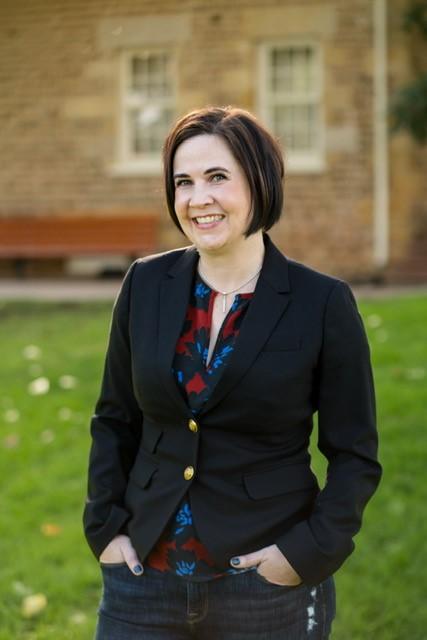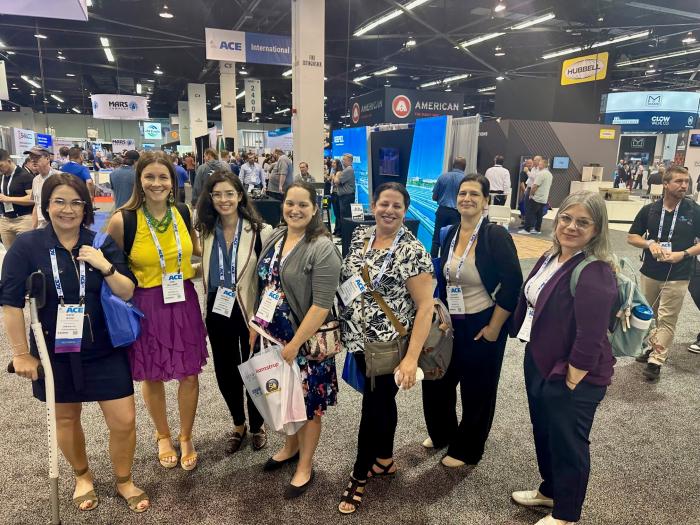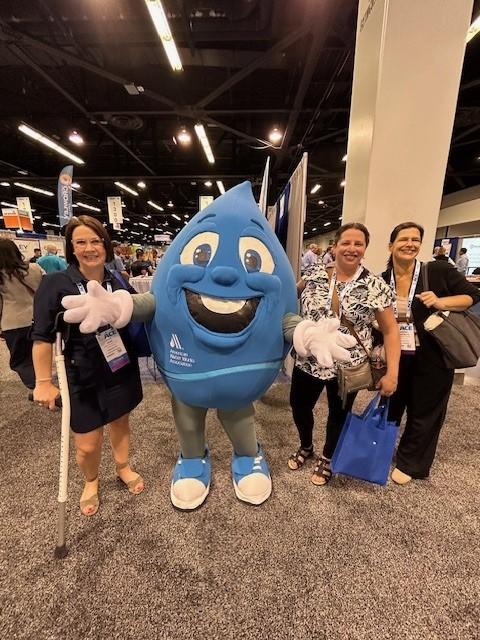Women in Engineering: Advocating for other women
Editor’s note: Women in Engineering Day was June 23 and Denver Water is highlighting some of the outstanding women engineers that help deliver clean, safe water to 1.5 million people every day. Read more about the outstanding people who work at Denver Water.
Katie Ross, an engineering manager and civil engineer, has worked at Denver Water for 14 years.
Having previously worked as a consultant in the private sector, Ross brings a wide range of talents and training to her job overseeing Denver Water’s engineering standards.
And remembering the challenges she dealt with early in her career when she was a young, female engineer, Ross advocates for and mentors women engineers and women looking to get into the industry.
Historically, engineering has been a male-dominated profession, with women representing close to 14% of the workforce, according to a 2019 U.S. Census Bureau report. Denver Water employees are involved in programs that encourage women to enter the field, and to encourage young girls and women in STEM careers.
We asked Ross to share her thoughts about women in engineering.
What’s your favorite thing about being an engineer?
At Denver Water, we’re solving problems. There are the five-minute, five-hour, five-day, and five-month problems that require leadership and collaboration. One day it might be helping our teams adjust to a material shortage, and another day will be prioritizing a main replacement in advance of a city’s transportation project. It’s very satisfying to help people and communities every day.
I love what I do in my work managing our Engineering Standards and Capital Projects Construction Standards. Anything tied to those standards ensures safety for our employees, our contractors, our customers and our community. What we do makes a difference and has a reach well beyond the Denver Water service area. I routinely talk with peers from around the country and have developed a peer network that allows me to have a larger presence in the water utility community.
For me personally, I love that no two days are the same. My job is diverse and interesting, and I get to work with many different people from across the country. Truly, there’s never a dull moment and it’s awesome.
Recent Colorado School of Mines graduate Viviana Verde reflects on her first job as an engineer — at Denver Water.
It’s really rewarding for me to have this career, particularly because at one point I almost gave it up. At a previous job, I felt like I was working myself to death as one of only a few women in a firm and was tired with what I had to deal with every day.
I went home one night and told my husband I was going to quit my job and be a Pilates instructor. He’s always encouraged me as an engineer, so instead of telling me I’d lost my mind, he simply said, “Katie, figure out how to do both.”
When this job opened up at Denver Water, I applied for it, got it, and now I’m an engineer and a Pilates instructor. Pilates is really about how to solve engineering problems with the human body, so it makes a whole lot of sense to me — and I’m focusing on my work and my health.
How did you get into this industry?
My family is mostly engineers. My father, brother, numerous cousins and my husband — they are all engineers.
When I was thinking about college, I told my dad that I didn’t know what I wanted to do. He basically said, “Well, you can be an engineer too. Do you want to go to Colorado School of Mines or Colorado State University?”
It cracks me up looking back at it, because it wasn’t a career counseling moment or a long-term discussion. I picked CSU and studied civil engineering.
What do you tell women and girls interested in this work?
First and foremost, it’s not what people think. People think you’re going to get stuck doing the same things over and over, but that’s not the case at all, it’s a very diverse job with all the opportunity you could want.
There’s a million ways to be an engineer — my family has proved that, for sure. My dad was an engineer with the Colorado Department of Public Health and Environment, while my uncle was an engineer at the Colorado Water Conservation Board. They didn’t do the same type of work or the same things, and they were both engineers.
I get to work on amazing projects as an engineer for a water provider, while my brother is a transportation engineer and is one of the engineers of record on a portion of the Bay Bridge construction project in California. I love that!
Read about the crucial role Katie Ross played in the redevelopment of the National Western Center.
Are you mentoring women and girls in their engineering careers?
While I’m not in a formal mentorship program, I am passionate about mentoring women and making sure they know their worth. I spend a lot of time talking with current and former co-workers or employees about how you can advocate for yourself.
Early on in my career, I didn’t have anyone looking out for me professionally. For me, mentorship also means support with career progression. Women have to know their worth and know they can move up.
One of the ways I help other women advance in their careers is by getting more women involved in American Water Works Association’s committees on industry standards. For a while, I was sitting in committee rooms where it was me and a bunch of men. I thought that was a problem, so I’ve been recruiting other women, and now when I go to these committee meetings, there are other women there next to me.
Having just completing AWWA’s ACE 2024 industry conference (held June 10-13, 2024, in Anaheim, California), I was encouraged by the participation of women at the association’s Standards Council and the various committee meetings.
Some of the mentoring I do also comes through connecting with people who reach out about Denver Water’s standards. Students will email with questions about our standards, and when I respond, I’m able to build connections. I also get quite a few emails from women who reach out through LinkedIn because they’re looking for ways to get into the industry and want to hear my advice.
The most important thing I tell women is, be who you are. I don’t want them to compromise who they are. To illustrate the point, I talk about khaki pants.
When I first started working as an engineer, I didn’t want to look overly girly or feminine as the one of the few women in the office, so I thought I should blend in with the men and wear button-down shirts and khaki pants. That wasn’t me. I was never comfortable in those clothes. Now, I wear what I want. Being an engineer is what I do for a living, it doesn’t completely define who I am.
Why is it important to you to support women in engineering?
We bring a different perspective. Not good or bad, just different. We also take a different approach to the work.
Growing up in this industry, I learned how different people could motivate or de-motivate co-workers. I was always taught by my parents that you treat everyone with respect.
Years ago, I was in a meeting where a young woman was being yelled at by a male engineer over contract language and I couldn’t stand by and let it go. I stopped the meeting and told him it wasn’t her fault that he hadn’t read the contract. Later, she told me she was shocked and grateful I’d stood up for her. I wanted her to know that kind of behavior wasn’t acceptable.
Join people with a passion at denverwater.org/Careers.
One of the things that I’ve also learned in my career is that “no” is a complete sentence. It’s especially important for young engineers to know this — that it’s OK to simply say “no.” There will be times when you’ll be asked for something or to do something that you know isn’t right, and it tests your confidence, especially when you’re trying to break into this industry.
When I was younger, my mom drilled it into me that there’s a clear difference between right and wrong. It's one of the reasons I love working on the engineering standards, mainly because it is the literal document that says this is right, that is wrong. Because of the standards, there’s no shades of gray. It reinforces that responsibility, which is a big responsibility, to our employees and the public to know that they’re safe.




